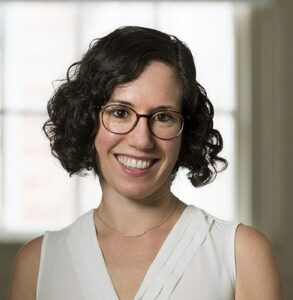 Mara Buchbinder, PhD is Assistant Professor of Social Medicine at UNC, Adjunct Assistant Professor of Anthropology at UNC, and Core Faculty of the UNC Center for Bioethics.
Mara Buchbinder, PhD is Assistant Professor of Social Medicine at UNC, Adjunct Assistant Professor of Anthropology at UNC, and Core Faculty of the UNC Center for Bioethics.
What does Bioethics mean to you?
I think that bioethics is a broad interdisciplinary field for engaging ethical challenges in medicine and the life sciences.
Why is it relevant? Why do you think that students should get involved in Bioethics?
I think that some of the most pressing and stubborn problems facing society today have bioethical implications, and I think that it engages a core set of issues that have a lot of relevance to public policy and to medical practice. In addition, thinking about bioethical problems can be a really useful exercise for thinking analytically in general because bioethical cases provide really interesting and relevant examples for how to approach thinking about problems. In other words, bioethics offers a conceptual toolkit for how to think through a problem.
What would you say is your specialization?
I came into the field of bioethics via my research on the patient-provider relationship and clinical communication, so I would say that my main interests within bioethics focus on clinical ethics. I have also become interested in broader policy issues pertaining to medical ethics.
When did you begin taking an interest in Bioethics?
I was familiar with bioethics when I was doing my graduate training, but it was really when I came to UNC that I became more interested in bioethics because it is such a strength and UNC, and I was really inspired by the colleagues that I have here, who were all working on such fascinating bioethics issues. So I increasingly moved my research in that direction.
What types of projects are you currently working on?
I’m working on two projects right now that have to do with the challenges that new medical laws raise for clinical practice. One of them is in the ending phase, but it’s looking at a North Carolina abortion law. More recently, I started a project that is looking at the legalization of physician aid-in-dying. I’m focusing on Vermont because they were the state that most recently legalized aid-in-dying (until the California law was passed last month). My research explores how Vermont residents have adapted to the law, and the ethical challenges that it raises, particularly for clinical communication.
What courses do you teach?
I teach in the Professional Development I and II sequence, which is a survey course for first year medical students. I also teach Professional Development III, which is a social science/humanities elective for second-year medical students. My seminar is on Reproductive Governance, which focuses on the culture and politics of reproduction.
Interview conducted by Olivia Dorsey.
